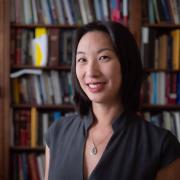On a snowy Saturday afternoon in mid-April, approximately 30 adults gather inside the Asian Pacific Development Center (APDC) in Aurora, Colorado, armed with pens and the $680 fee required to apply for U.S. citizenship. A team of volunteer attorneys, translators, and APDC staff stand by to help clients with the pre-screening interview and lengthy application—the first steps for eligible green card holders to become naturalized citizens.

Abby Frame ('18) assisting a client at the Asian Pacific Development Center's naturalization drive.
Abby Frame (’18), a volunteer at the drive, sits beside a Burmese woman, going line by line through the 30-page application. A translator helps explain the detailed questions about previous travel, family members, medical history, and more. By the end of the day, Frame said she had a new understanding of the many challenges faced by those seeking U.S. citizenship.
"During my first year of law school, I was focused a lot on myself and my law school world—reading, studying, and taking exams. Volunteering at the drive was a good reminder of the reason why I wanted to go to law school in the first place—to get out there and help people," said Frame, who interned in the family and child unit at Colorado Legal Services last summer and is interested in pursuing a career as an immigration lawyer. “It was so rewarding to help people with a challenging form like this one."
Associate Professor Ming Hsu Chen teaches classes on citizenship and immigration law, and also works with community organizations to coordinate events—like this one—that bring together law students and members of the immigration law community. To provide students with a more robust picture of immigration, her courses on citizenship and immigration law incorporate fieldwork methods like volunteering at naturalization drives hosted by organizations such as Mi Familia Vota and the APDC; observing removal hearings at the Denver Immigration Court; attending a naturalization ceremony; and interviewing those with firsthand experience with the immigrant experience, including foreign students, Deferred Action for Childhood Arrivals (DACA) recipients, children of undocumented parents, or asylees working on an Employment Authorization Document (EAD), and legal permanent residents.
"Volunteering with immigrants in the community puts a live face to the laws that we are learning in class," Chen said. "It’s really moving for a lot of students and gives them a more vivid picture of who it is they will eventually be helping with the knowledge they are learning in the classroom."

Ming Hsu Chen
"Colorado is more diverse than people realize in Boulder, and my students really enjoy connecting with other people in the community. Through their fieldwork, they make a lot of discoveries about why immigrants would be eager for a pathway to citizenship, what obstacles they confront even once formally eligible, and how lawyers can help," she said.
Chen’s parents are Chinese and Taiwanese immigrants who came to the United States after the passage in 1965 of the Hart-Celler Act, which abolished many of the previous restrictions on immigrants from Asia and Africa entering the U.S. As a teenager growing up in California, she experienced the passage of California Proposition 187, which was designed to make those in the country illegally ineligible for public benefits, including non-emergency health care, public education, and other services in the state.
"I witnessed a lot of key moments in the immigration movement,” she said. "I knew with the passing of Proposition 187 that a lot of the public benefits would be cut off for many of my classmates, and that piqued my interest in the area of immigration rights."
- Citizenship and Equality Workshop, led by UCLA Professor of Law Ingrid Eagly, which will bring together faculty and students for discussions on connecting scholarship, teaching, and community engagement (co-sponsored by the Colorado Law Immigration Law and Policy Society (ILPS))
- Film viewing of 14: Dred Scott, Wong Kim Ark & Vanessa Lopez, a documentary on citizenship (co-sponsored by the student-led APALSA and ILPS)
For more information about these events, please contact Professor Chen.
Ming Hsu Chen is associate professor at the University of Colorado Law School whose research and teaching concern public law, immigration and citizenship, race, and empirical legal studies. Her current research examines regulatory responses to undocumented immigration and cooperative federalism. She has previously written or published articles on the political incorporation of Asian Americans and minority vote dilution, the post-9/11 treatment of Muslim Americans, asylum adjudication, and the role of faith in public life. She has also given public lectures on contemporary developments in immigration law and race.
This article originally appeared in the fall 2016 issue of Amicus, Colorado Law's semi-annual alumni magazine. Read the issue here.


